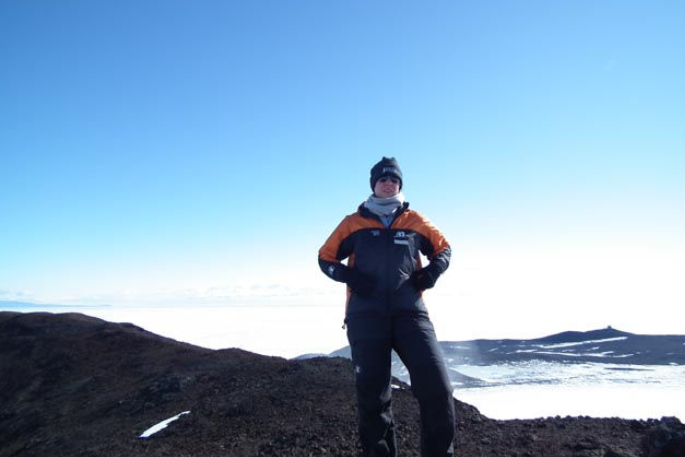A new project seeks to improve weather prediction models and environmental data collection of polar regions to enhance operational safety and reduce environmental risks.
The four-year Polar Coupled Analysis and Prediction for Services (PCAPS) project is an international collaboration addressing the critical need for timely and high-resolution weather forecasts in the Antarctic and Arctic, where operations are high-risk, and observational coverage is significantly lacking.
PCAPS, championed by the World Meteorological Organization’s (WMO) World Weather Research Programme (WWRP) and co-chaired by Te Whare Wānanga o Waitaha | University of Canterbury’s (UC) Associate Professor Daniela Liggett and Jørn Kristiansen from Met Norway, focuses on collecting and analysing data to fill gaps in environmental forecasting capabilities, supporting research efforts, and enhancing the accuracy of meteorological predictions and services for polar areas.
Associate Professor Liggett, from UC’s School of Earth and Environment, has a strong research interest in environmental management and tourism regulation in extreme environments, and is leading the social-science component of PCAPS.
She said in polar regions, accurate weather predictions such as wind, visibility and cloud cover forecasts are essential for various activities including tourism, fishing, and scientific research.
“In the polar regions, we have much poorer data coverage and forecasting availability and reliability than elsewhere in the world. This is a great gap because operations there are always of much higher risk,” Associate Professor Liggett said.
“Despite its size, New Zealand has a significant impact on research and governance in the Antarctic, particularly through its involvement with MetService New Zealand and Maritime New Zealand.
“Maritime New Zealand is responsible for the rescue coordination of the Southern Ocean, so they're quite interested in the potential implications of having better services to make operations safer,” she said.
“Disasters that threaten human life also have significant environmental impacts. By improving our forecasting capabilities, we can mitigate all these risks.”
Improved forecasting would not only enhance the safety of operations but also reduce their carbon footprints and costs.
“An aircraft heading to the Antarctic relies on weather forecasts that aren’t necessarily reliable. Sometimes they have to turn around halfway because the weather in the Antarctic has changed.
“It’s the same with research operations from ships, where helicopters are launched from. They rely on certain weather and wind conditions,” Associate Professor Liggett said.
The project also highlights the disparity between the Arctic and Antarctic in terms of polar prediction advancements.
“The Antarctic is still a poor cousin of the Arctic when it comes to polar prediction. We have Artic settlements and people living in the Arctic. You could argue we also have research stations and tourism camps in the Antarctic but it's not the same level of permanent settlement to the extent we see in the Arctic, which also has sovereign regions,” she said.
According to Associate Professor Liggett this international status leaves the Antarctic outside the usual scope of data and forecasting provided by independent countries for their sovereign regions.
She explains PCAPS functions as a networking and facilitation initiative, broadening its international and interdisciplinary reach. While the project is building on existing data, it also requires gathering more information.
“Essentially, PCAPS aims to stimulate and enhance ongoing scientific efforts.
“It supports new projects where researchers are addressing current knowledge gaps and seeking funding. These projects can apply for endorsement from WMO, which can help secure that funding.
“PCAPS enhances global linkages and involves many talented researchers across diverse disciplines, from social scientists to atmospheric researchers.
“This type of collaboration is rare but increasingly important. Addressing complex issues like climate change requires multidisciplinary approaches, making this project particularly exciting.”
Many UC researchers, including Professor Wolfgang Rack, Associate Professor Marwan Katurji, and Professor Adrian McDonald, are already involved in projects that are of great relevance to PCAPS.



0 comments
Leave a Comment
You must be logged in to make a comment.